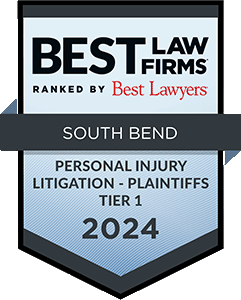 When a car accident happens, determining fault is usually straightforward. Generally, one driver is negligent and causes a crash after running a red light or stop sign, following too closely, improperly changing lanes, speeding, etc., which results in injuries and damages to another.
When a car accident happens, determining fault is usually straightforward. Generally, one driver is negligent and causes a crash after running a red light or stop sign, following too closely, improperly changing lanes, speeding, etc., which results in injuries and damages to another.
Drivers who cause a crash may deny fault or try to blame the other driver for the crash. But what if a driver claims a medical emergency as a reason for the crash?
There are a few things that need to be considered when a driver who caused a crash claims a sudden medical emergency, including the driving laws in the state where the accident occurred.
The Sudden Emergency Doctrine in Indiana
In Indiana, the law offers protection to drivers who cause an accident due to a sudden medical emergency. If the driver lost consciousness because of an unforeseen medical emergency and due to his or her blackout lost control of the vehicle and caused an accident, it may be determined that the driver did not act negligently, therefore his or her insurance is not liable for damages.
However, invoking this defense does come with its own responsibility, including needing to prove that the medical emergency was sudden and unforeseen.
Proving the Medical Emergency Was Unforeseen
When a driver invokes this emergency doctrine to avoid liability, the burden of proof shifts to him or her. This means the driver now needs to prove he or she did indeed suffer an unforeseen, or unpredictable, medical emergency and did not act negligently.
This is different than a regular personal injury case because typically, the burden of proof is on the person filing the injury claim and he or she must prove by a preponderance of evidence that his or her injuries were caused by the negligence of another driver.
Proving the incident could not have been predicted means the person must prove he or she did not have any way of knowing that the medical emergency would happen at all. This could be proved by showing the person had no history of any medical issues or, if they did, a doctor cleared him or her to drive.
A person who has a known disability may not be able to invoke this argument since his or her condition was known before the accident and therefore it was not an unforeseeable medical emergency.
Who is Potentially Liable for Damages?
If a driver can successfully invoke the sudden emergency doctrine as a defense, he or she may not be held liable for the accident and so his or her insurance company will not have to pay for any damages.
This is where the situation may get complicated for an accident victim who was injured because of the crash. Indiana is a tort state, which means that after an accident, the insurance company for the person found liable for the crash is the one that pays. But if no one is liable, who pays for the victim’s injuries?
One option is to go through your own personal injury protection insurance policy which is an optional add-on to the required state minimum of bodily injury and property damage liability coverage. This would allow you to file a claim for medical bills and treatment, lost wages and other damages related to your own personal injuries after an accident.
Speak to a Knowledgeable Attorney
If you or a loved one have been in an accident where the other driver is claiming he or she had a sudden medical emergency before the crash, call a car accident attorney in South Bend to discuss your rights.
Our attorneys know the laws in Indiana and are prepared to help you recover compensation if we are able to validate your claim. We do not charge you anything upfront and only get paid when you do.
Pfeifer, Morgan & Stesiak. Free Initial Consultations. Phone: (844) 678-1800











